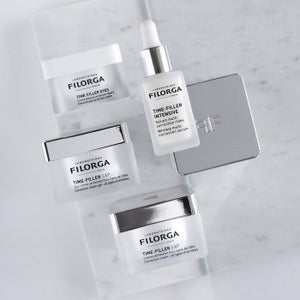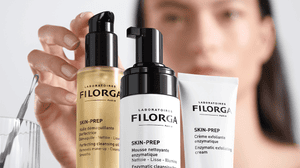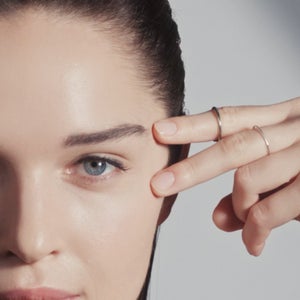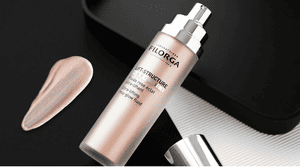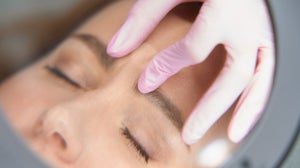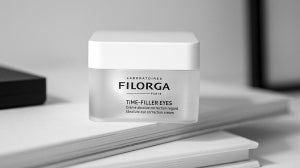
Nobody likes dark circles, bags under their eyes, or looking tired in general. The reason why all women attach so much importance to their eyes is because the eye area is usually the most noticeable part of the face. This area is very unique and complex, with fragile skin and specific marks not found elsewhere on the body, making it very difficult to treat as a whole.
…but not for Laboratoires FILORGA, who has been making anti-ageing and revitalising skincare products for the eye area for years. In this article, we want to share our expertise with you and provide an overview of the top things to consider when choosing and using your eye cream.
The eye area is particularly fragile and delicate
A 2015 study showed that, with an average thickness of 0.1 mm, the skin around the eyes is the thinnestand most fragile skin on the face. This has several consequences:
The skin has fewer capillaries. It is less vascularised, which makes drainage of the area more difficult and can lead to a build-up of pigment in the vessels just under the skin. This accumulation is what causes dark circles.
There are fewer lymphatic vessels that help to decongest the eye area by removing excess water. This causes bags under the eyes.
The skin also has fewer sebaceous glands and therefore produces less sebum. Combined with water from within the body, sebum forms the hydrolipidic film on the surface of the epidermis. This film is therefore thinner than on the rest of the face, which makes the eye contour area more vulnerable to damaging environmental factors, dehydration, and therefore to premature ageing of the skin.
Start moisturising around your eyes now
As we have just seen, the skin around the eyes is very sensitive to dehydration due to its structure — and skin that is dry is skin that ages faster. The eye contour area is also constantly moving: when you squint because of the sun, when you frown, when you smile, etc. These repeated movements take their toll on your skin. After the age of 25, poorly moisturised skin can lead to the appearance of wrinkles and other fine lines, like crow's feet.
This is why it is essential to moisturise around the eyes and include this anti-ageing treatment in your routine sooner rather than later.
Lack of sleep is immediately visible around the eyes
Lack of sleep can accelerate skin ageing. When we sleep, our bodies produce melatonin, a hormone that helps regulate our circadian rhythm (the internal process that governs our sleep-wake cycle over roughly 24-hour periods). Melatonin is also a natural antioxidant that helps protect our skin from free radicals that can cause cell damage and accelerate ageing.
During sleep, our bodies also regenerate the cells of our skin. This is when the production of collagen and elastin, two proteins that help maintain the skin's elasticity and firmness, is at its peak. Lack of sleep can therefore lead to a reduction in the production of these proteins, which can accelerate the appearance of wrinkles and fine lines.
Finally, lack of sleep can also affect blood circulation, which, as discussed above, has a direct relationship with dark circles and bags under the eyes.
When treating the eye area, more doesn’t mean better
You may think that the more cream you apply, the better the results. Well, think again! By using too much, you overload the skin's ability to absorb substances you apply to it, which can lead to a build-up of material resulting in unwanted swelling or rough-looking skin.
You can rest assured that our creams work even in small doses. When it comes to our eye care products, a dose roughly the size of a grain of rice is enough to beautify your eyes!
How to apply eye care correctly
How the treatment is applied is of utmost importance.
First of all, timing is important: as a general rule, you should apply the treatment twice a day — in the morning and in the evening before going to bed — always on clean skin. Applying the treatment in the evening will reduce the signs of fatigue in the morning, while applying in the morning complements the previous application and also prepares the skin to resist damaging environmental factors.
Then, application methods differ depending on where you’re applying the treatment around the eye. Here are some tips specifically suited to each area:
Apply with smoothing movements to the upper and lower eye area, from the inside outwards, up to the temples, taking care not to apply the cream too close to the eyes.
Be careful not to apply too much pressure, so as not to damage the subcutaneous blood and lymph vessels.
Finally, tap with your fingertips under your dark circles.
Expert advice: to give your eyes a fresh boost in the morning, put the eye contour cream in the fridge!
FILORGA helps choose the right skincare product for you
Based on your needs, FILORGA experts have formulated different eye care products which, in addition to their individual benefits, all contain FILORGA's star ingredient: NCEF.
TIME-FILLER EYES 5XP skincare is the latest product from Laboratoires FILORGA. It targets dark circles and all wrinkles around the eyes.
OPTIM-EYES cream is a 3-in-1 anti-dark circle and anti-puffiness treatment that also acts on fine lines around the eyes. Its fresh, smooth texture is particularly suitable for sensitive eyes.
OXYGEN-GLOW EYES skincare is specially formulated to boost the radiance of the eyes and reduce dark circles, with immediate results.
NCEF-REVERSE EYES skincare contains active ingredients inspired by aesthetic medicine. It is a multi-correction treatment that targets dark circles, puffiness, and wrinkles, while restoring firmness and radiance to the eye area.
Finally, GLOBAL-REPAIR EYES & LIPS skincare has been specially created to treat the delicate areas around the eyes and lips. It moisturises and restores radiance to your eyes while acting on dark circles, puffiness, wrinkles, and sagging.
Since 1978, Laboratoires FILORGA has established itself as a leading expert in cosmetics inspired by aesthetic medicine. Our products are renowned for their scientific rigour. To find out more, have a look at our article on the structure of the skin, which will help you understand how to properly look after it.
Mehling, Annette & Fluhr, Joachim. (2006). Chronobiology: Biological Clocks and Rhythms of the Skin. Skin pharmacology and physiology. 19. 182-9. 10.1159/000093113.
Chopra K, Calva D, Sosin M, Tadisina KK, Banda A, De La Cruz C, Chaudhry MR, Legesse T, Drachenberg CB, Manson PN, Christy MR. A comprehensive examination of topographic thickness of skin in the human face. Aesthet Surg J. 2015 Nov;35(8):1007-13. doi: 10.1093/asj/sjv079. PMID: 26508650.
Von Arx T, Tamura K, Yukiya O, Lozanoff S. The Face – A Vascular Perspective. A literature review. Swiss Dent J. 2018 May 14;128(5):382-392. PMID: 29734800.


